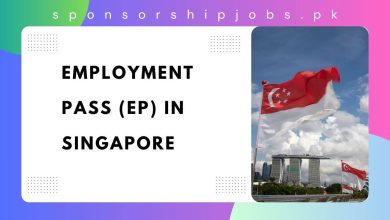German Opportunity Card 2026 – Job Applications
The Chancenkarte, also known as the Germany Opportunity Card, is a new residence permit that is intended to attract skilled laborers from non-EU countries to Germany. This innovative visa program will enable individuals to enter Germany and pursue employment for a maximum of one year, regardless of whether they have a job offer in hand.
In contrast, this article delves into the Opportunity Card’s purpose, eligibility criteria, benefits, distinctions from other German work visas, and the step-by-step application process.
Check Also: Unskilled Jobs in Germany for Foreigners – Apply Now
Germany Opportunity Card:
The Germany Opportunity Card’s primary objective is to address Germany’s labor shortages by attracting skilled workers from around the globe. Germany’s objective is to fortify its workforce, improve its economy, and preserve its competitive advantage in a variety of industries by providing a flexible employment trajectory.
Benefits:
- Work and Residence Permit: The Blue Card EU enables non-EU citizens to work and reside in Germany for a predetermined period, which is typically correlated with the duration of the employment contract. The initial period is up to four years.
- High-Skilled Employment: The Blue Card EU is intended for highly skilled professionals, particularly in sectors that are experiencing labor shortages, such as IT, engineering, mathematics, natural sciences, and healthcare.
- Family Reunification: Blue Card holders can transport their spouse and dependent children to Germany, fostering family unity and cohesion.
- Freedom of Movement: Blue Card holders are permitted to travel freely within the Schengen Area for tourism and brief stays in other member states without the requirement for additional visas.
- Fast-Track to Permanent Residency: If certain conditions are met, holders of the Blue Card EU can petition for permanent residency in Germany after 33 months of employment (or 21 months if they demonstrate sufficient language proficiency).
- Access to Social Services: Germany’s social services, such as healthcare, education, and social welfare programs, are accessible to Blue Card holders and their families, thereby guaranteeing a high quality of life.
- Flexibility in Employment: Blue Card holders are permitted to alter their employment within their area of expertise, provided that the new position satisfies the Blue Card program’s salary and qualification standards.
- Spouse Employment: The spouses of Blue Card holders are eligible to work in Germany without the need for a distinct work permit, which improves household income and the integration of the spouse into the labor market.
- Pathway to German Citizenship: Blue Card EU holders may be eligible to apply for German citizenship after residing in Germany for a specified period, typically eight years, and satisfying other criteria.
- Language Integration: Although it is not required to obtain the Blue Card EU, the acquisition of the German language can facilitate social integration and offer supplementary opportunities for personal and professional development in Germany.
Eligibility Criteria:
A minimum of six points is necessary to meet the eligibility criteria for the Opportunity Card, which is based on a points system. The following is the method by which the points are awarded:
- Requirements: Three points for a university degree and two points for two years of vocational training.
- Professional Experience: Two years of professional experience, preceded by vocational training: Two points
- Language Proficiency: Three points for German (Level above B2), one point for German (Level A2), and one point for English (Level C1).
- Age: 2 points for individuals under the age of 35, 1 point for those between the ages of 36 and 40.
- Previous Residence in Germany: A minimum of six months within the past five years (excluding tourism): One point
- Eligibility of the Spouse: One point will be awarded if the spouse also fulfills the eligibility requirements for the Opportunity Card.
- Qualified capabilities in a bottleneck profession: 1 point Profession in Demand:
Distinctive character:
The Opportunity Card is distinguished from conventional German work visas in several significant ways:
- Job Offer Not Required: The Opportunity Card is a departure from the majority of work visas, which require a confirmed job offer before application. It enables individuals to enter Germany and pursue employment for a period of up to one year. This expands opportunities for job seekers and provides flexibility.
- Points-Based System: The Opportunity Card utilizes a points-based system to evaluate eligibility, taking into account factors such as age, language skills, work experience, and qualifications. This is distinct from other visas that may concentrate exclusively on specific employment offers or qualifications.
- Emphasize Potential: The Opportunity Card underscores the potential contribution of skilled workers to the German economy, rather than solely their immediate employment status. This provides opportunities for individuals who have not yet secured employment but possess valuable talents.
- Residence Pathway: The process of settling in Germany is simplified for successful job applicants who can transition from the Opportunity Card to a longer-term residence permit. This is distinct from temporary work visas, which may not provide an obvious path to permanent residency.
- Part-Time Work Flexibility: Opportunity Card holders are permitted to work part-time for a maximum of 20 hours per week while they are in the process of seeking employment, which provides financial assistance during the job search. This is not possible in all cases when using other work visas.
Comparison:
The chart below delineates the fundamental distinctions between the German opportunity card, EU blue card, and job seeker visa of Germany:
| FEATURE | OPPORTUNITY CARD | EU BLUE CARD | JOB SEEKER VISA |
|---|---|---|---|
| Job offer required | No | Yes | No |
| Points-based system | Yes | No (but minimum salary threshold applies) | No |
| Focus | Potential contribution and skillset | Highly qualified professionals in specific fields | General job search in any field |
| Pathway to residence | Yes (upon finding qualified employment) | Yes (after a certain period of employment) | Possible, but less straightforward |
| Flexibility for part-time work | Yes (up to 20 hours per week) | Usually allowed with employer’s permission | Not explicitly allowed |
Application Process:
The Germany Opportunity Card application process will commence. The following are the stages to follow:
Check Your Eligibility:
Examine the points-based system to guarantee that you satisfy the minimum requirements of six points. Use online calculators, such as the one available on Einwanderungsberater:
Gather Required Documents:
- A valid passport
- Evidence of qualifications (certificates of vocational training or university degrees)
- Employment contracts and reference letters serve as evidence of employment experience.
- Proof of proficiency in the German or English language (certificates)
- Evidence of financial resources (bank statements, employment contract for a part-time position)
Apply Online or In-Person
- Online: Through the Consular Services. Apply Online
- In-Person: At the German embassy or consulate in your country of origin.
Await Processing and Decision:
Be prepared for potential delays, as the processing time may fluctuate.
Conclusion:
The Germany Opportunity Card distinguishes itself from conventional work visa options by providing a distinctive and adaptable route for competent individuals to investigate career opportunities in Germany. It offers an exceptional opportunity for qualified workers from non-EU countries to contribute to the German economy and establish a future in Germany due to its points-based system and emphasis on potential.
Frequently Asked Questions:
What will be Germany’s new visa?
One initiative is the ‘Opportunity Card’.Effective, the visa system allows non-European Union (EU) citizens to relocate to Germany for a year to explore job opportunities.
Who is eligible for a job seeker visa in Germany?
You have a minimum of five years of experience in your related profession. You have enough financial resources to support your stay in Germany. You have proof of having completed academic or vocational training. Germany recognizes your qualifications or considers them equivalent to a diploma you received there.
In Germany, how do I get an opportunity card?
You can apply for an Opportunity Card online via the Consular Services portal, or locally at a German embassy or consulate in your country. You cannot apply if you are already in Germany.



